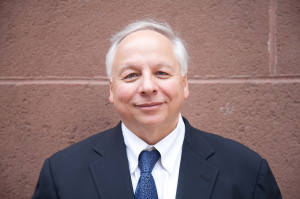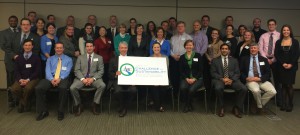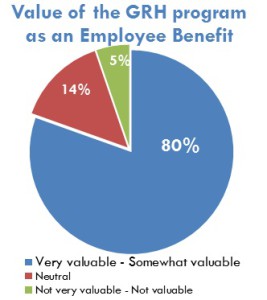Posts from December 2014
ABC Year in Review
December 30, 2014
 2014 has been another great year for A Better City. We welcomed seven new members to the organization: Boston Global Investors, Gerding Edlen, HNTB, Jamestown LLC., Jones Lang LaSalle Inc., Keville Enterprises, Inc., ZipCar, each of whom will add new ideas and insight on how ABC can help improve the economic competitiveness of the region. At our 2014 Norman B. Leventhal Excellence in City Building Awards we celebrated our leaders in elected office that were championing efforts to fund and support transportation throughout the Commonwealth; Steve Samuels for his commitment to creating a new neighborhood in the Fenway; and Fred Laskey for his years of leadership in leading the MWRA and helping clean the Boston Harbor. This year’s event drew a record crowd of over 300 attendees and almost 60 sponsors. The continued growth and success of the organization is a testament to the vital role we play for both our members and our stakeholders as the leading voice of the business community on issues pertaining to transportation, land development and the environment.
On the transportation policy front, we were as busy as ever and provided our expertise on a number of in initiatives. I was honored to be able to co-chair the Transportation and Infrastructure Transition Team for Mayor Walsh, and we began the year by presenting a comprehensive report to the Mayor which will provide him and his staff . . .
2014 has been another great year for A Better City. We welcomed seven new members to the organization: Boston Global Investors, Gerding Edlen, HNTB, Jamestown LLC., Jones Lang LaSalle Inc., Keville Enterprises, Inc., ZipCar, each of whom will add new ideas and insight on how ABC can help improve the economic competitiveness of the region. At our 2014 Norman B. Leventhal Excellence in City Building Awards we celebrated our leaders in elected office that were championing efforts to fund and support transportation throughout the Commonwealth; Steve Samuels for his commitment to creating a new neighborhood in the Fenway; and Fred Laskey for his years of leadership in leading the MWRA and helping clean the Boston Harbor. This year’s event drew a record crowd of over 300 attendees and almost 60 sponsors. The continued growth and success of the organization is a testament to the vital role we play for both our members and our stakeholders as the leading voice of the business community on issues pertaining to transportation, land development and the environment.
On the transportation policy front, we were as busy as ever and provided our expertise on a number of in initiatives. I was honored to be able to co-chair the Transportation and Infrastructure Transition Team for Mayor Walsh, and we began the year by presenting a comprehensive report to the Mayor which will provide him and his staff . . .
ABC Advising Go Boston 2030
December 30, 2014
Go Boston 2030, an initiative of the City of Boston Transportation Department, will envision a bold transportation future for Boston for the next 5, 10 and 15 years.The plan will develop a far-reaching vision that proposes transformative polices and projects to improve transportation for the city’s residents, businesses and visitors. The two-year process will be driven by data and steered through an unprecedented and inclusive public engagement process.” A Better City’s President and CEO, Rick Dimino, is co-chairing the external advisory committee managing this effort, in partnership with State Representative Russell Holmes. The plan includes a number of important components including public engagement and comprehensive data analysis and technical work on transportation recommendations. The plan will kick off in earnest next year with the launch of The Question Campaign, in which Boston residents and employees will be given the opportunity to ask questions to guide the work of the plan and important ideas and suggestions to the attention of policymakers. The project website can be found at; http://goboston2030.org, and we hope that all of our partners will sign up to be engaged in this . . .
Appointed to MassDOT’s Value Capture Commission
December 30, 2014
ABC President and CEO Rick Dimino was recently appointed by Governor Patrick to MassDOT’s Value Capture Commission. Established by, the Transportation Finance Act of 2013, the commission will explore innovative ways of financing transportation infrastructure through capturing an increment of the increased economic activity and value created from transportation projects and investments. The commission will work towards completing a series of policy, legislative and regulatory recommendations early next year. We are thrilled that ABC member Tom O’Brien, of HYM Investments, is also a member of the commission and is actively participating with us in this important . . .
Challenge for Sustainability Program Launches 6th Year
December 30, 2014
A Better City kicked-off the 2015 Challenge for Sustainability on December 9th 2014 at the offices of Wilmer Hale at 60 State Street owned and managed by Oxford Properties, both Challenge participants. The event, featuring Brian Swett, Chief of Environment for the City of Boston, welcomed new and returning participants representing close to 50 million square feet of the city’s largest commercial real estate properties and major employers that are working to reduce greenhouse gas emissions from their facilities 25% by 2020. A special welcome goes out to the following companies and buildings that will be joining the Challenge in 2015:
AECOM: 100 Summer Street
Bard, Rao + Athanas Consulting Engineers: 311 Arsenal Street (Watertown)
Equity Office: 195 Summer Street, 100 Summer Street, 399 Boylston Street, 175 Federal Street and 500 Boylston Street
Jamestown Properties: 245 First Street(Cambridge), The Innovation and Design Building, and The Newbury Collection
KPMG: 60 South Street
MetLife: 655 Atlantic Avenue
Oxford Properties: 225 Franklin Street, 60 State Street, 125 Summer Street, and 1 Memorial Drive (Cambridge)
State Street: State Street Financial Center, Channel Center, John Adams Building (Quincy), Josiah Quincy Building (Quincy), Crown Colony Office Park (Quincy)
Coinciding with the program’s growth, the Challenge for Sustainability has launched a new website where participants and the public can access online benchmarking tools and sustainability resources including case studies and technical toolkits, at www.challengeforsustainability.org
 The Challenge for Sustainability . . .
The Challenge for Sustainability . . .
Your Feedback at Work: Guaranteed Ride Home Survey
December 05, 2014
Your responses are helping us shape our plans for 2015! Recently, ABC TMA conducted a survey of participants in the Guaranteed Ride Home program, which provides a free ride home to TMA members in the event of an emergency. With over 500 responses to the survey, ABC TMA is busy analyzing your feedback and looking for insights on how to design an even more cutting edge GRH program that meets members' needs and exceeds expectations. We are excited for the recommendations and changes this may lead us to in 2015 and wanted to share some of the 'raw results' of the survey.
 Overwhelming support
Overwhelming support
80% of participants indicated that the Guaranteed Ride Home program was valuable to them. Also, over 16% of respondents said that they would drive to work more frequently if the program was not available. These results clearly illustrate the GRH program as both encouraging TMA members to chose more sustainable transportation options and benefiting the Boston area by reducing the number of cars on the road, which in turn reduces congestion and improves air quality.
Looking to the future
When we asked participants to rank potential changes to the GRH program, the majority placed greatest importance on having the flexibility to book a ride with a taxi or livery service of their choice. Another interesting note, is that while participants ranked the utilization of an app to book a ride as lower in importance, 77% indicated that they would use an app if one were available.In the Market for Energy Efficiency: Responding to Rising Energy Rates
December 04, 2014
The business case for energy efficiency is growing stronger. With energy prices in New England this winter projected to be the highest they have ever been, it is important for businesses to continue to explore new and innovative ways to reduce and conserve energy while staying on top of market trends and ahead of potential savings opportunities. So, what factors are influencing the energy markets and how can businesses maximize savings in the face of high energy prices? Last month, at the Challenge Monthly Meeting, Bruce Buckbee of World Energy, an energy management services firm, discussed the impending high energy prices and the implications demand and fuel sources have on New England energy markets. In his presentation, he identified the key reasons attributed to the surge in rates: -In New England, about 60% of electricity is generated from natural gas. Over the past three years, there has been a substantial increase in residential customers switching from heating oil to natural gas. Because residential customers get distribution priority on the pipeline in the winter, electricity generators are forced to switch to their backup fuel, oil, which is more expensive and leads to a rise in wholesale electricity prices. -Overall increases in energy demand, on both a regional and national level, are affecting local energy rates. Due to limited pipeline infrastructure in New England, the demand exceeds the available supply and prices increase to account for these inefficiencies. -Looking to the long-term implications, the new capacity zones, scheduled to be introduced in 2016 in New England, will divide the singular zone of New England into four separate capacity zones: Northeast, Massachusetts, Connecticut, Maine and the rest of New England. The nearly doubled capacity costs in the new Northeast zone are projected to drive up prices to account for the increase in demand. While other factors could lead to the rise or fall in energy rates, businesses and . . .




